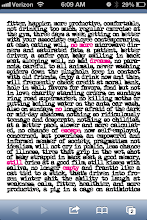As I mentioned in class on Thursday, Pamela was really irritating me for many valid reasons. I will explore each of these one by one, in explicit detail because as I read, I can't help but notice how horribly bad this book is pissing me off.....And thus my list of complaints begins....
1. Are we really supposed to believe this girl???
This first questions highlights the main underlying issue of all the other issues raised: Can we trust our information source? As I first started reading, I began thinking about the means in which the story is delivered, which is a series of letters from Pamela, mostly addressed to her parents (at least up to page 108). These letters are very problematic for a number of reasons.
First, Because they are letters from the "dutiful Daughter," to her parents, she has a very particular audience that she is appealing to. Because of this narrow scope, the reader has reason to assume that the information presented in the letters may be skewed, especially since her parents are very adamant about her moral and virtuous nature. She wouldn't want to ruin herself and disappoint her parents. Even if she strayed from her moral and virtuous nature, I find it very hard to believe that she would write about this to her parents.
Secondly, her letters read more like stories than reports of actual events. At the beginning of Letter XXX, Pamela starts the letter out hoping that she can deliver it to them in person and leave the next day (Thursday), but ends the letter saying that she has to stay there for another fortnight. This type of inconsistency signals that she is writing for entertainment purposes rather than just letting her parents know that she is doing just fine. On 77, Pamela mentoins that she will tell stories of her life at this manor as entertainment. Does this mean she's fabricating them a bit to make them more interesting or rewriting the story to fully entertain her parents with the idea of her virtuous nature? She is also often referred to a "scribbling woman," suggesting that she was a fictional story writer which is how her letters read. There is something about the tone of them that makes a reader wonder about their validity and question Pamela's account of events.
2. Someone's a little full of herself....
I started to count the number of times she called herself virtuous, reminded her parents of her virtuous nature, or something along those lines and lost count. It really started to get old. Then I started to think, damn this girl is a little full of herself. This supports her unreliability as a narrator because her letters become full of self-promotion and making herself look like her parents little virtuous princess. She also cites her beauty over and over and over again as well. She talks about how everyone admires her and makes it a point to bring up how important her virtue is to her and what lengths she will go to to protect it. She makes it seem like she is willing to give up a pretty comfortable and luxurious life in order to keep our virtue (which the reader finds out is not entirely true....great princess quote on 81 that I'll probably visit later). I would give page numbers, but I would probably end up citing the whole book thus far. She also consistantly reminds her parents in her letters to them on how much better off she is at her Master's home and points out her elevated status. The are multiple instance of this (p 76 is one I have off the top of my head). Even though she says she is not ashamed of her lowly past or the lowly state of her parents, she is not as wiling to go back to that lifestyle as she makes it seem (see 80-81).
3. Whose story do we believe?
Even within Pamela's own narrative in the letters to her parents, the stories of Pamela and her Master don't always match up. Pamela makes it a point to highlight her innocence and make the Master out to be a vile pig while she has no idea of his bad intentions and always seems to have these outstanding instances with hiding in closets and all sorts of other bizarre stuff (the closet hiding is a whole other issue...). According to Pamela, she is always the unsuspecting victim. The Master tells the story a little differently, pointing out her "wit and good sense" (83, 73), how she has damaged his name, and other things that show she is capable to know what is going on and may be telling the story a little differently to protect herself. She also often portarys herself as being a little firty and using her beauty in ways she's probably not mentioning to her parents (62, 63). Who's at fault here: Pamela or the Master? So far this is a little unclear.
More to come on this later..............
Saturday, February 28, 2009
Subscribe to:
Post Comments (Atom)




No comments:
Post a Comment